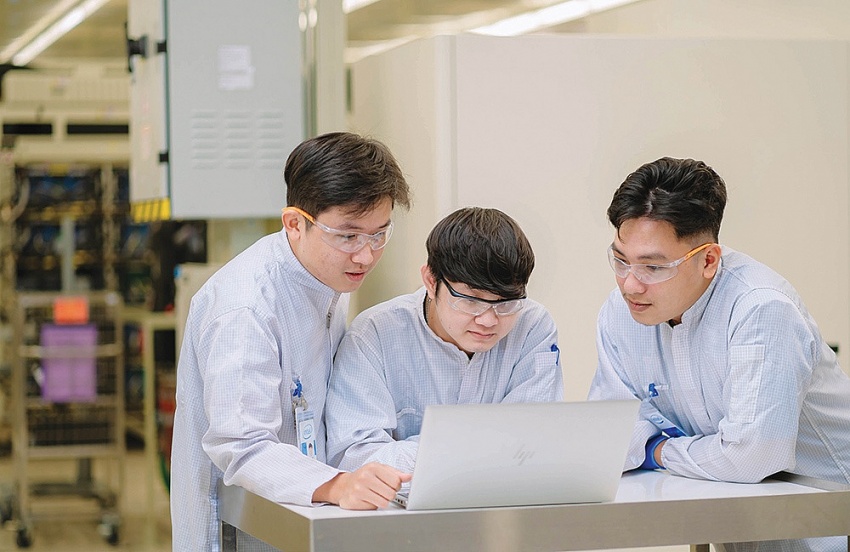Tie-ups grow for microchip advancement
Phenikaa University in Hanoi is cooperating with major universities globally in semiconductor training such as Arizona, and tech enterprises such as Synopsys Corporation, as part of its effort to ramp up semiconductor training.
 |
| Some education establishments have invested in simulation-related facilities and equipped new software, photo Le Toan |
With these collaborations, the university expects to learn from experience and receive technology transfer. They also cooperate in training programmes which are crucial to train engineers with internationally recognised certificates.
Le Anh Son, deputy general director of Phenikaa Group, and vice principal of Phenikaa University said that in early 2024, the university starts opening training programmes related to integrated circuit (IC) design. In May, it also opened the IC design training centre on the university campus.
He told VIR, “The school has invested in simulation-related facilities and equipped with software from the world’s foremost brands. Regarding people, the school now has a training team available and is preparing for training the next-generation team.”
Phenikaa marks strong steps in the semiconductor industry in Vietnam by having strategic investments, including establishment of Phenikaa Semiconductor Company in IC design and related services, and the IC design training centre to train people according to the upskill model based on customer needs.
By 2030, Phenikaa sets a goal of training at least 8,000 chip design engineers and 12,000 engineers following the upskill model, high-level workers in assembly, testing, and packaging factories, meeting about 40 per cent of the industry’s expected personnel needs.
According to Professor Nguyen Quoc Sy, chairman of the VinIT Technology Institute, and Professor of Moscow National Energy University, to realise the government’s goal of training about 50,000 Vietnamese semiconductor engineers by 2030, there needs to be supportive policies from the government for universities training workers in the semiconductor industry; and the participation of the private sector and major companies and universities worldwide.
“The private sector has an important role in developing human resources in the semiconductor industry in Vietnam. They have the advantage of flexibility, are not constrained by institutions, and can proactively mobilise financial resources and others,” Prof. Sy said. “FPT University, Phenikaa, and Ho Chi Minh City National University are the top units following this trend.”
Anticipating future potential, other universities have also made strong moves. Private technology group FPT, which operates FPT University, and India’s Jetking Academy launched a semiconductor circuit design programme in March.
The programme focuses on practical training, accounting for up to 70 per cent of the total studying time. After two years of studying, students will have practical knowledge and skills, meeting the needs of high-quality human resources in the semiconductor chip industry among Vietnamese and global businesses.
In September 2023, FPT University combined with FPT Semiconductor to establish a department to train high-quality human resources for the billion-dollar industry, starting this year.
FPT University is also cooperating with many universities in the US and Taiwan to design programmes, textbooks, and training standards. It is strengthening ties with tech companies in this field and plans to train 15,000 people, with 10,000 to be trained at its main facility in the central city of Danang.
Dr. Le Truong Tung, chairman of the FPT University Council, said, “FPT’s ambition is to have a large enough quantity and good enough quality to meet the needs of this industry abroad. For example, in Taiwan and South Korea, factories need large-scale human resources but are in serious shortage. Therefore, we need a training model that trains fast and has good quality.”
This ambition is built on its goals of expanding abroad, where its revenue reached $1 billion last year.
Similarly, Vietnam National University in Ho Chi Minh City (VNU) is training about 6,000 students in industry groups directly and indirectly related to semiconductor technology.
Member universities of VNU are training over 1,800 engineers and 500 masters in circuit design, and VNU plans to build a modern training programme, granting industrial and international certificates in IC design to about 15,000 engineers.
A representative of VNU said, “We invited experts from major universities in Japan, Taiwan, and South Korea to help build a semiconductor technology training programme. We are expected in 2024 to establish two new laboratories, capable of sharing throughout the university network and those in the southern region. In addition, the Institute of Semiconductor Technology has been established as a focal unit.”
Other universities are also joining the race. According to statistics from the Ministry of Education and Training, up to now, many higher education institutions have announced that they have opened or are preparing to open this major, including Hanoi University of Science and Technology, Hanoi National University, Danang University, Can Tho University, and Saigon International University.
Le Anh Son of Phenikaa, however, admitted that it is a new field for Vietnam, and new approaches may be needed.
“Like Phenikaa, all schools have difficulties with teaching staff. Fortunately, we have a fairly wide training network to attract experts from around the world to train our staff,” Son said. “In addition, semiconductor training requires large investments. This requires the cooperation of all parties, and specific supporting policies from the government for training as well as the industry as a whole.”
Dr. Nguyen Quan, former Minister of Science and Technology, added, “Currently, some universities are ready to prepare a team of lecturers so they can promptly introduce specialised training in microchips and semiconductors from the 2024-2025 school year. The problem is that it is necessary to investigate market demands and the possibilities of cooperating with the world’s major IC companies in training.”
According to Prof. Sy, human resources are one of the important bottlenecks in developing the semiconductor industry in Vietnam. Senior staff and experts for training at sci-tech universities are needed, as well as a more modern equipment system and research documents for training.
“Considering these factors, we are yet to have a sufficient force of experts with enough capacity to train. Equipment systems, research facilities, and specialised laboratories are still lacking,” Prof. Sy admitted. “Quantity is critical to meet market demand, but we need to pay close attention to output quality because the semiconductor training requires very high quality.”
| Le nam Trung, deputy director, Authority of ICT Industry and Communications Ministry of Information and Communications The Ministry of Information and Communications (MIC) is currently gathering comments and ideas from ministries, agencies, domestic and foreign experts and international consulting groups to complete the content of the draft strategy for developing Vietnam’s semiconductor industry to 2030, with a vision towards 2050 and then will submit to the government for approval. The strategy identifies talent as the foundation of the semiconductor industry, taking human resources as top priority, the decisive factor to be autonomous and become a global semiconductor human resource centre at all stages. Vietnam has a young population, a large population size, and advantages in developing science, technology, engineering and mathematics human resources. Tools to support the design of semiconductor products are increasingly popular, creating stronger conditions for innovative startups and small- and medium-sized enterprises to participate in the semiconductor industry market. Vietnam has the potential to provide manufacturing services for the semiconductor industry, building a Vietnamese brand in semiconductors. To concretise the tasks of developing human resources in the semiconductor industry, the government assigned the Ministry of Planning and Investment (MPI) to develop a scheme on developing human resources in the semiconductor industry towards 2030, with a vision towards 2045 which is currently being submitted to the government for approval. According to the draft scheme, the MIC is responsible for developing policies to support human resource development for the semiconductor industry within the scope of management. To implement it, the MIC plans to coordinate with the MPI to implement the contents of the scheme to ensure adherence to the goals of the related strategy on developing the national semiconductor industry, while studying and proposing solutions to strengthen the connection of technology enterprises in the human resource training process; as well as research and development and tech transfer activities. Nguyen Thi Ton Cam Tram, general manager Business Unit Technology DKSH Vietnam The semiconductor technology industry in Vietnam is growing strongly, attracting the attention of many businesses and international organisations, gradually making Vietnam a reliable partner in the semiconductor ecosystem. However, to develop, Vietnam still faces many challenges, including concentrating large investment resources and training highly qualified human resources. Many international companies and corporations such as Intel, Samsung, and LG have invested in Vietnam, setting up production and research facilities. Currently, Intel and Samsung are two of the three largest chip manufacturers in the world, investing in the production of semiconductor devices and components in Vietnam. In addition, a number of other top businesses such as Renesas and Synopsys also choose Vietnam as their destination. Research institutes and universities in Vietnam are also promoting research and training in semiconductors. Cooperation with international organisations and businesses also helps improve the quality of training and research. With increasing demands for high-tech and electronic products, the semiconductor market in Vietnam is forecast to continue to expand. Semiconductor applications in many fields such as telecommunications, healthcare, automobiles and consumer electronics are creating many growth opportunities. |
 | Vietnam welcomes Indian interest in hi-tech and semiconductor sectors The Vietnamese government opens its arms to Indian entrepreneurs and businesses to invest in high-technology, semiconductors, and digital technology, according to Deputy Minister of Information and Communications Bui Hoang Phuong. |
| Hung Yen prioritises Taiwanese semiconductor enterprises to invest in IP No. 5 A business delegation from the Taiwan Electrical and Electronic Manufacturers' Association (China) on May 22 came to the northern province of Hung Yen to seek investment opportunities. |
 | US chipmakers hit ground running with Vietnam plans US chipmakers have bolstered their operations and partnership activities in Vietnam as the country emerges as a semiconductor hub amid the AI boom. |
 | Vietnam may require $7 billion investment for pilot semiconductor production Deputy Prime Minister Tran Hong Ha has announced that Vietnam will invest in several research centres to support universities and innovation hubs, with pilot production costs potentially reaching $7 billion, necessitating collaboration between the government and the private sector. |
What the stars mean:
★ Poor ★ ★ Promising ★★★ Good ★★★★ Very good ★★★★★ Exceptional
Related Contents
Latest News
More News
- SK Innovation-led consortium wins $2.3 billion LNG project in Nghe An (February 25, 2026 | 07:56)
- THACO opens $70 million manufacturing complex in Danang (February 25, 2026 | 07:54)
- Phu Quoc International Airport expansion approved to meet rising demand (February 24, 2026 | 10:00)
- Bac Giang International Logistics Centre faces land clearance barrier (February 24, 2026 | 08:00)
- Bright prospects abound in European investment (February 19, 2026 | 20:27)
- Internal strengths attest to commitment to progress (February 19, 2026 | 20:13)
- Vietnam, New Zealand seek level-up in ties (February 19, 2026 | 18:06)
- Untapped potential in relations with Indonesia (February 19, 2026 | 17:56)
- German strengths match Vietnamese aspirations (February 19, 2026 | 17:40)
- Kim Long Motor and AOJ Suzhou enter strategic partnership (February 16, 2026 | 13:27)

 Tag:
Tag:
















 Mobile Version
Mobile Version